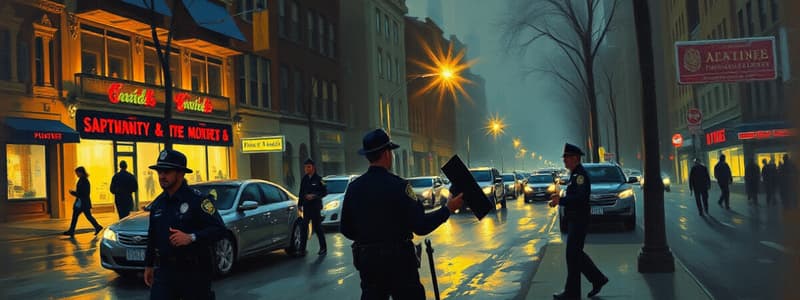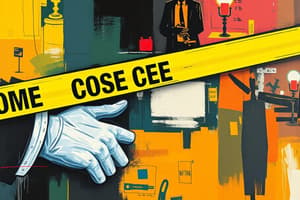Podcast
Questions and Answers
What was the main conclusion of the Kansas City Preventive Patrol Experiment?
What was the main conclusion of the Kansas City Preventive Patrol Experiment?
- Increased patrol has no effect on crime
- Random patrolling decreases crime (correct)
- Preventive patrol is unnecessary
- Random driving around can reduce crime (correct)
What three patrol techniques were studied in the Kansas City Preventive Patrol Experiment?
What three patrol techniques were studied in the Kansas City Preventive Patrol Experiment?
No preventive patrol, increased patrol, and usual level of service
The Kansas City Preventive Patrol Experiment confirmed existing assumptions about patrol.
The Kansas City Preventive Patrol Experiment confirmed existing assumptions about patrol.
False (B)
The ______ effect of policing was not weakened by ___________ of routine patrolling.
The ______ effect of policing was not weakened by ___________ of routine patrolling.
Citizens' _____ of crime and ____________ toward police were not affected.
Citizens' _____ of crime and ____________ toward police were not affected.
What was the police ability to do in the Kansas City Preventive Patrol Experiment?
What was the police ability to do in the Kansas City Preventive Patrol Experiment?
What is team policing?
What is team policing?
Team policing included a permanent team assignment to __________.
Team policing included a permanent team assignment to __________.
In team policing, officers tended to be __________.
In team policing, officers tended to be __________.
Team policing maximized ______________, coordination between ______ ___________ and ______________.
Team policing maximized ______________, coordination between ______ ___________ and ______________.
What does team decision-making in policing emphasize?
What does team decision-making in policing emphasize?
What are the methods outlined in the Kansas City Outcomes?
What are the methods outlined in the Kansas City Outcomes?
What was the purpose of directed patrol in New Haven in 1975?
What was the purpose of directed patrol in New Haven in 1975?
Which patrol technique decreased crime by 18%?
Which patrol technique decreased crime by 18%?
Foot patrol in the late 1970s led to a decrease in crime levels.
Foot patrol in the late 1970s led to a decrease in crime levels.
Police _________ _____ affected ability to arrest perpetrators.
Police _________ _____ affected ability to arrest perpetrators.
The Kansas City study found response time was ___________ to the probability of making an ______ or locating __________.
The Kansas City study found response time was ___________ to the probability of making an ______ or locating __________.
What is regarded as a major determining factor in the ability to tackle crime?
What is regarded as a major determining factor in the ability to tackle crime?
Officers today engage in ___________ __________ activities and random ____________ _______.
Officers today engage in ___________ __________ activities and random ____________ _______.
Patrol officer deployment needs to consider ______ and _____ crimes occur.
Patrol officer deployment needs to consider ______ and _____ crimes occur.
Patrol officers must be _________________ about their _____ assignment.
Patrol officers must be _________________ about their _____ assignment.
What are the hours for the day shift?
What are the hours for the day shift?
What is a characteristic of the 'day shift'?
What is a characteristic of the 'day shift'?
What are the hours for the swing shift?
What are the hours for the swing shift?
What are the hours for the graveyard shift?
What are the hours for the graveyard shift?
Beats vary in terms of _____________ and _______________ character.
Beats vary in terms of _____________ and _______________ character.
Cops' rules of the beat culture include: don't get involved in another officer's sector; don't leave work for the next duty shift; don't slack off.
Cops' rules of the beat culture include: don't get involved in another officer's sector; don't leave work for the next duty shift; don't slack off.
What is the number one goal of all police officers?
What is the number one goal of all police officers?
What is a concern when confronting citizens for police officers?
What is a concern when confronting citizens for police officers?
There has been a recent ________ in fatal ___________ of police officers.
There has been a recent ________ in fatal ___________ of police officers.
Which officers generally get slain according to the data?
Which officers generally get slain according to the data?
Define 'suicide by cop'.
Define 'suicide by cop'.
What does the Law Enforcement Officers Safety Act of 2004 exempt?
What does the Law Enforcement Officers Safety Act of 2004 exempt?
Flashcards are hidden until you start studying
Study Notes
Kansas City Preventive Patrol Experiment
- Conducted in 1973, studied the impact of random patrol on crime rates over one year.
- Evaluated three patrol strategies: no preventive patrol, increased patrol, and standard service levels.
- Challenged conventional assumptions regarding the effectiveness of police patrols.
- Found that the deterrent effect of policing remained strong despite the elimination of routine patrols.
- Citizens' fears of crime and attitudes toward police were not significantly altered by changes in patrol strategies.
- Police responsiveness to calls remained unchanged during the experiment.
Team Policing
- First major effort to reform police practices towards community involvement, though it was short-lived.
- Officers assigned to permanent teams focused on specific neighborhoods.
- Emphasized officers as generalists, allowing them to develop a range of skills.
- Improved communication and coordination among team members and the community.
Kansas City Outcomes
- Included team policing, directed patrol, and split-force patrol as key strategies.
- Directed patrol involved targeted efforts, exemplified by deterrent runs in New Haven (1975).
- Split-force patrol in Wilmington increased productivity by 20% and reduced crime by 18%.
Foot Patrol
- Introduced in the late 1970s to alleviate citizen fear and build community relationships.
- While it did not affect crime levels, it positively influenced residents’ attitudes towards police.
Response Time and Arrests
- Response time is crucial for effective arrests but found to be unrelated to the success of locating witnesses or making arrests.
- The time between a crime occurring and being reported is a major factor impacting police effectiveness.
Modern Policing Practices
- Officers now engage in problem-solving activities and preventive patrol when not responding to calls.
- Patrol officers must be knowledgeable about their assigned beats to be effective.
Shift Definitions
- Day shift (8 AM-4 PM): Highest citizen interaction, most errands, and significant crime occurrence.
- Swing shift (4 PM-12 AM): Features most disturbances and arrests.
- Graveyard shift (12 AM-8 AM): Often staffed by less senior officers and comes with challenges.
Beat Culture and Officer Safety
- Officers operate under specific "cops' rules" to maintain order, emphasizing non-involvement in others' sectors and work continuity.
- Primary goal of officers is to ensure their own survival in the line of duty.
- Recent spike in ambush incidents against police officers highlights growing dangers in policing.
- "Suicide by cop" refers to individuals provoking police to use lethal force, often as a means of committing suicide.
Legislative Framework
- Law Enforcement Officers Safety Act of 2004 provides exemptions for qualified officers, allowing them to carry firearms across state lines.
Studying That Suits You
Use AI to generate personalized quizzes and flashcards to suit your learning preferences.




